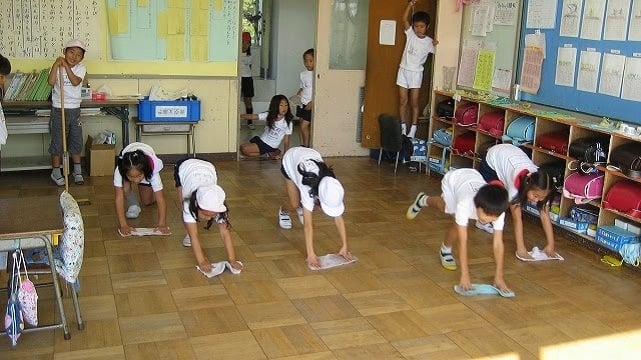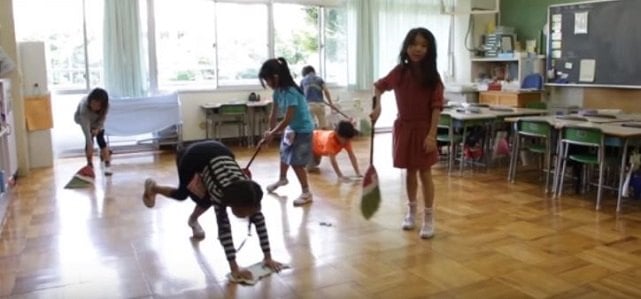In Japan, students don’t take exams until they reach the age of 10. Until that point, it is deemed more important for Japanese students to learn to live. They are taught how to live. They learn to take care of animals, to respect people, and to understand nature. Children are taught values like self-control, responsibility, and justice.
Why don’t Japanese schools hire school janitors?
As part of their education, children are taught to keep their surroundings clean. If everyone takes care of and respects shared space, everyone will be existing in a harmonious environment. It is believed that learning this mentality will teach children respect and responsibility. They will understand that cleaning is everybody’s responsibility. So students don’t see themselves as above such work; they help each other out during cleaning duties.
Children eat lunch at school, and they are responsible for bringing their garbage to the recycling zone and cleaning the table before they leave. Every milk box is collected to be recycled. Students also eat lunch in the classroom with their teacher, which creates a closer bond between student and teacher. At lunch time, the students are responsible for serving food to teachers; there are no lunch workers. Once lunch finishes, clean-up is so thorough, you won’t be able to tell that anyone had eaten there!
Not only that, but many schools grow their own food and children are taught to cook easy and healthy meals. Again, it is not about the food. It is about education. This social approach to education helps students improve autonomy, responsibility, and encourages the development of a strong work ethic.
What are the long-term benefits?
As stated before, teaching students the responsibility of cleaning up after themselves is great way to facilitate a culture where cleaning is right. Also, this action encourages mutual respect. They are taught to preserve a clean shared space, and become a team working to benefit each other. As they clean, children take the opportunity to chat with their friends, so it is not a boring task.
In fact, it’s not just about the activity of cleaning – It is not the action itself but the meaning behind the act. The same principle would apply if the children were told to paint the classroom, or to keep the grass pruned. The fact is that they are taught to work as a team in caring for their environment. When they grow older, these children will continue to respect and take care of the space around them. They’ll never forget this good habit. The cleaning task is just a tool to teach them a habit.
As Michael Auslin, a former English teacher in Japan, said in a quote for NPR, “School is not just for learning from a book, It’s about learning how to become a member of society and taking responsibility for oneself”. The purpose of public school is to educate in all aspects, not just book-learning. They train them to live. In their future, no one is going to clean up after them, so they better learn to do it now.
Photo: Nishatha Bijeesh
What can parents learn from this story?
Children need to be educated. Education is not only a means to develop their intelligence, but to become a useful person. A human that cares about other human beings and nature. School time is a great period in our children’s lives. School is where they learn new skills, habits, and experiences so we should make this experience outstanding.
As parents, we should take a minute to evaluate this method in instructing our children. We must understand that they need to be respectful, responsible and justice-oriented. There is no point in only improving their intelligence while undermining their humanity. Maybe we do not want to see our children cleaning and washing, but we surely want them to become well-rounded individuals. Remember that it is not the action, but the final result that is important.
What do you think?
Featured photo credit: Koh Mui Fong via todayonline.com














































